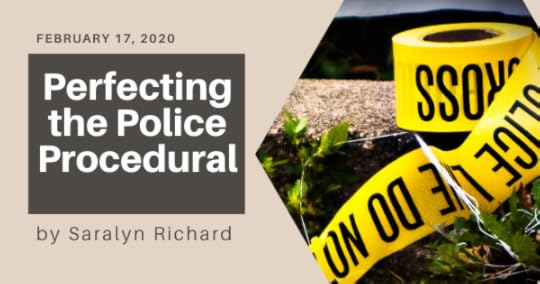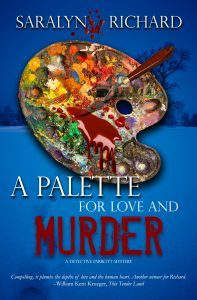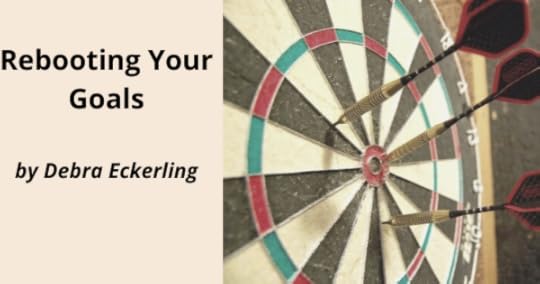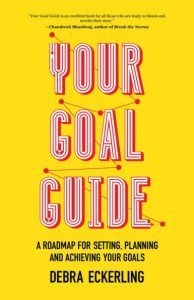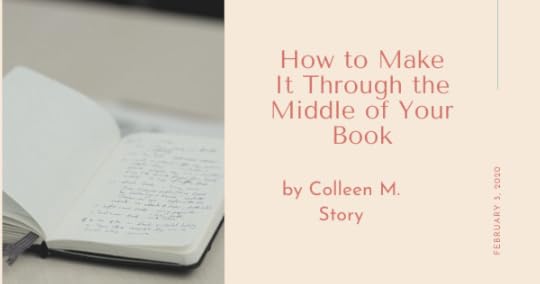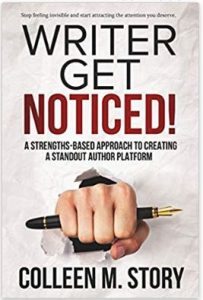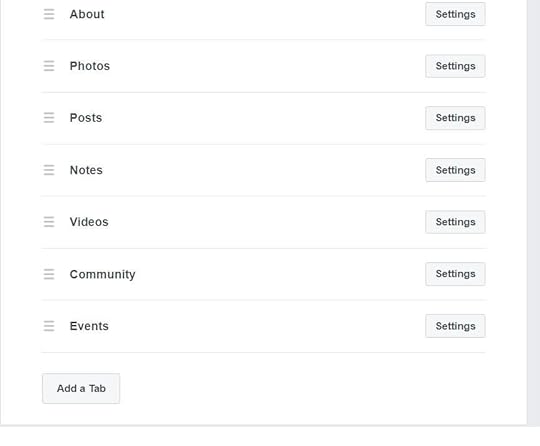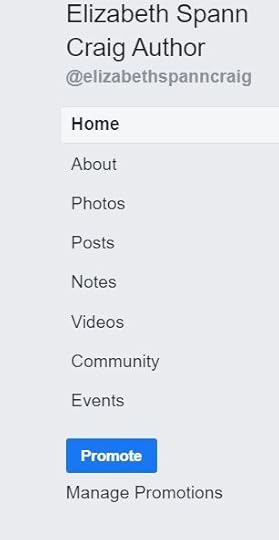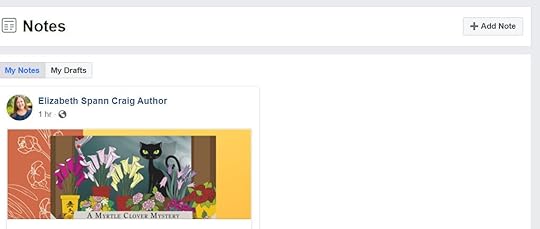Elizabeth Spann Craig's Blog, page 54
February 22, 2020
Twitterific Writing Links
by Elizabeth S. Craig, @elizabethscraig
Twitterific writing links are fed into the Writer’s Knowledge Base search engine (developed by writer and software engineer Mike Fleming) which has over 50,000 free articles on writing related topics. It’s the search engine for writers.
Have you visited the WKB lately? Check out the new redesign where you can browse by category, and sign up for free writing articles, on topics you choose, delivered to your email inbox! Sign up for the Hiveword newsletter here.
New Stuff:
I noticed in industry expert Jane Friedman’s newsletter that she’s hosting a $25 class to help authors improve their websites. You can find more information at her website.
Business / Miscellaneous
Financial Independence, Retire Early (FIRE) For Authors: @ChooseFi @thecreativepenn
“My Best Writing Advice for the Next Decade”: @FaeRowen
Writer Mark Dawson’s 2019 in Review: @SelfPubForm
Conferences and Events / Miscellaneous
British Book Awards Celebrates Three Decades: The ’30 From 30′ Longlist: @Porter_Anderson @pubperspectives
2020 PROSE Awards Name 157 Finalists in Five Far-Flung Categories: @Porter_Anderson @AmericanPublish
CONTEC Mexico 2020: Focus on Storytelling, AI, and Transmedia: @Porter_Anderson @pubperspectives
British Council Announces London Book Fair’s Sharjah Cultural Program: @Porter_Anderson @pubperspectives
International Publishers Association Events at the 2020 London Book Fair: @Porter_Anderson @IntPublishers @LondonBookFair
Creativity and Inspiration / Goal setting
Your Writing Process: 7 Habits for Success: @nownovel
Writing Goals: 9 Steps on How to Set and Meet Your Writing Goals: @goodbyeburnout @SelfPublishing7
Creativity and Inspiration / Inspiration / Reading as Writers
The Only Untranslatable American Writer: by Brian Evenson @parisreview
Internet Dystopias after Trump: @ecourtem @PublicBooks
How to Read After Becoming a Parent: @LizMooreBooks @lithub
Top 10 dinner parties in fiction: @FrenchNicci @GuardianBooks
Three Books that Explore the Violence of Women’s Appetites: @katie_gutz @CrimeReads
Rereading the Master of ‘Dying Teen’ Lit: @katyhersh @lithub
Virginia Woolf’s Mother Haunts Much of Her Writing: by Gillian Gill @lithub
Creativity and Inspiration / Writing Life
20 Embarrassing Things Writers Say: @GiveMeYourTeeth @LitReactor
Dealing with writer envy: @pubcoach
Eight Ways To Help You Be A Smarter Writer in 2020: by PJ Parrish
What to Do When You Want to Quit: @charitybradford
Why Some Writers Are Afraid to Take Breaks: @MegDowell
What happens to our online lives after we die? @EvaCharlesAnna @sciencemagazine
Writing Tips: What Writers Can Learn From Bodybuilders: by Dave Terruso @thecreativepenn
Saying “No” to Get Your More Important “Yes”: @Julie_Glover
Seven Ways to Grow Your Resilience as a Writer: @RealAlexWoolf @sfwa
Self-Care Gifts For Writers: @TheLeighShulman
Writing Tips: 5 Ways to Quiet Your Inner Editor: @HeidiFiedler @thecreativepenn
Just Breathe… You’ve Got This: @SueColetta1 @killzoneauthors
Unique Gifts for Writers: @LindaKSienkwicz
Genres / Horror
A Look at The Masked Knife-Wielding Psycho: by T.L. Bodine
Genres / Mystery
Crime Writing: Criminal Mischief: Body Disposal Isn’t Easy: @DPLyle
Research to Perfect a Police Procedural: @SaralynRichard
The New Voices of Country Noir: @nkolakowski @CrimeReads
The Elements of the Haunted House: A Primer: by Emily Littlejohn @CrimeReads
Why We Love Looking for Hidden Symbols—In Thrillers and In Real Life: @ellencrosby @CrimeReads
Why Cozy Mysteries Are The Hottest TV Genre Of 2020: @kthorjensen @geekdotcom
Shooting For Survival: Are Your Heroes Properly Trained? : @LeeLofland
Genres / Poetry
Why Isn’t More Poetry Funny? @helpfulsnowman @LitReactor
Genres / Screenwriting
The Business of Screenwriting: Everything You Wanted to Know About Specs: @GoIntoTheStory
Promo / Images
Open access image libraries – a list: @Apollo_magazine
Promo / Miscellaneous
3 Fiction Marketing Success Tips for 2020: @sandrabeckwith @JFbookman
Promo / Social Media Tips
Social Media Case Study: Author Rachel Hollis: @DanBlank @msrachelhollis
11 Ways to Update Your Online Presence: @WordDreams
Promo / Speaking
How to Get Speaking Gigs for Conferences: @WritersCoach
Promo / Video
How to Start a YouTube Channel: @MichaelLaRonn
Tips to Become a Television Guest: @KarenHWhiting @EdieMelson
Publishing / Miscellaneous
Literary Magazines with Themes–“On the Premises”: @MelindaJBrasher
Bertelsmann and Penguin Random House: Climate Neutral by 2030: @Porter_Anderson @pubperspectives
At CONTEC Mexico, Publishers Are Told ‘We’re Multi-Platform Beings’: By Adam Critchley @pubperspectives @rogercasas
Publishing / News / Amazon
What Book Publishers Need to Know About the Amazon Buy Box (2020): @IngramContent
Publishing / News / International Publishing
Polish Sport Book Awards Dominated by Female and Male Mountaineers: @Porter_Anderson @pubperspectives
Québec Édition’s Many Points of Outreach: ‘We’re Quite Busy’: @Porter_Anderson @pubperspectives
Publishing Scotland Funds 14 Translations; Frankfurt’s LitAg Sells Out: @Porter_Anderson @pubperspectives @PublishScotland
China Bestsellers January 2020: Educational Boosts in Tough Times: @Porter_Anderson @pubperspectives
Industry Notes: Italy’s 18App Is Funded; International Book Fairs Eye COVID-19: @Porter_Anderson @pubperspectives
Spain’s New Bookish Habits Report: 68.6 Percent Reading: @Porter_Anderson @pubperspectives
Publishing / Options / Traditional Publishing / Querying
Finding an Agent and Tips for Queries: @NathanBransford @shewritesdotcom @NaNoWriMo
How do I find an agent? @pubcoach
Publishing / Process / Services to Avoid
Should You Pay To Display Your Book At BookExpo? (Short Answer: No): @victoriastrauss @JaneFriedman
Writing Craft / Beginnings
34 Compelling First Lines of Famous Books: @Scribendiinc
Writing Craft / Characters / Development
This Therapy Secret Will Transform Your Character Development: @joebunting @write_practice
The cure for a boring character? Let them surprise us. by Michael Bjork
Writing Characters: Why Emotion Matters: @Lindasclare
Writing Craft / Characters / Protagonists
The Struggle is Real: Make Your Protagonist Suffer for Success: @SeptCFawkes
Writing Craft / Characters / Supporting Characters
Supporting Characters and Theme: 6 Important Questions to Ask About Your Story: @KMWeiland
Writing Craft / Common Mistakes
Mastering Show, Don’t Tell: @AngelaAckerman
Writing Craft / Conflict
Writing Fight Scenes With Female Characters: @AikiFlinthart @thecreativepenn
Writing Craft / Diversity
Why You Shouldn’t Be Afraid to Write Disabled Characters: @_HannahHeath
Writing Craft / Endings
How to write a conclusion for an essay: by Edwin L. Battistella @OUPAcademic
Writing Craft / Lessons from Books and Film
Writing Lessons from TV Shows: Gravity Falls: @VictoriaGHowell
Top 10 Badass Female Antiheroes You Need To Know: @Bang2write
Writing Craft / Miscellaneous
How to Bore an Editor to Death: @davidfarland
Practice Writing Fiction: 5 Core Skills to Improve Your Writing: Resources: by Joslyn Chase @write_practice
Writing an Overweight Character: by Ta-Guel
Why Some Dark Topics Are More Sensitive Than Others: by Oren Ashkenazi @mythcreants
Plot vs Character: Which Comes First? @rachelmcwrites @IndieAuthorALLI
Entice Your Readers with “Surprisingness”: @LiveWriteThrive
Obligatory Scenes and Conventions: @SeptCFawkes
Writing Craft / POV
Five Ways to Make Multiple Viewpoints More Engaging: by Chris Winkle @mythcreants
Writing Craft / Pre-Writing / Plotting
Signpost Scene: The Final Battle: @abigailkperry @DIYMFA
Writing Craft / Pre-Writing / Story Concept
How to Get Writing Ideas: 7 Insights from Goodreads: @nownovel
Author Insights: What’s Our Core Story? @JamiGold
Writing Craft / Punctuation and Grammar
How to use the existential “there”: by Edwin L. Battistella @OUPAcademic
Completing your verbs—infinitive and gerunds: by Edwin L. Battistella @OUPAcademic
Indirect References to Questions: @writing_tips
Writing Craft / Revision
Painless Editing in Easy Steps: @imogenclark @WomenWriters
Writing Craft / Scenes / Conflict
Conflict Thesaurus Entry: Being Turned Down by a Potential Love Interest: @beccapuglisi
Writing Craft / Synopses
The Dreaded Synopsis: @AJHumpage
Writing Craft / Tropes
10 Best Family Tropes in Fiction: @jennamoreci
Writing Craft / World-Building
Tips for Working Complex Worldbuilding Into a Story: by Oren Ashkenazi @mythcreants
Writing Tools / Books
Helpful Books for Writers: @AnneJanzer
The Top Writing Links From Last Week Are On Twitterific:
Click To Tweet
The post Twitterific Writing Links appeared first on Elizabeth Spann Craig.
February 16, 2020
Perfecting the Police Procedural
by Saralyn Richard, @SaralynRichard
The heart of any mystery novel is a good story. But when writing a police procedural, having a good story is not enough.
A police procedural is a form of detective fiction in which a crime is solved by members of the criminal justice system, including police, forensic specialists, and medical examiners. The team of problem-solvers works together to gather and evaluate clues, collect evidence, form hypotheses, and use these things to bring criminals to justice.
When my first mystery novel was named a finalist for best police procedural, one of my friends remarked, “Wow, and that’s the hardest genre to write!” I laughed at her comment, but as I thought about it later, I realized there is a bit of truth to it.
What makes police procedurals complicated is the need to be authentic and accurate. Doing so requires familiarity with the latest methods of forensic science for the time period of the novel. For example, a contemporary story in which the dominant investigative method is fingerprinting and footsteps, would draw criticism from readers who expect DNA and trajectories and sophisticated toxicology.
Equally important is the need to know specific protocols used in the setting’s locale. Procedures for serving notice, interviewing witnesses and suspects, bagging evidence, and sharing information with other investigative entities is often specific to the state or country of the crime’s jurisdiction. As an example, in Brandywine Valley, where my Detective Parrott Mystery series takes place, wills are probated through the Supreme Court of Pennsylvania’s Standardized Register of Wills and Orphans’ Court. Since I don’t live in Pennsylvania, I would never have known this fact without research.
Speaking of research, I have had wonderful experiences visiting with people who have expertise in solving crimes, whether I know them personally or not. As public servants, police officers are usually friendly and welcoming when I’ve imposed on their time to answer questions for fictional crimes. Most of the time I rely on a local police lieutenant, who is generous with his responses to my questions. Sometimes, though, I call upon the police departments in other cities. When I introduce myself as an author of detective fiction, I always receive a warm response. I believe it’s because the professional crime fighters appreciate my desire to portray them accurately.
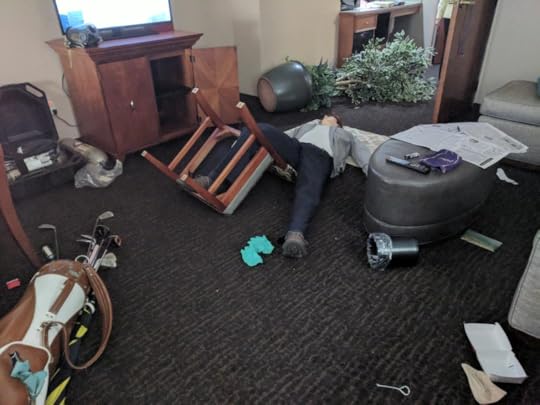
Last summer I attended the Killer Nashville writers’ conference, a gathering of mystery and thriller writers from all over the world. One of the activities at the conference was a mock crime scene, set up by Dan Royse, former Tennessee FBI Assistant Director. For 48 hours, conference attendees were invited to visit the hotel suite, where a dead mannequin was sprawled on the carpet. Abundant items were scattered about, replicating an actual case from the past. Our job, should we choose to accept it, was to determine which items were pertinent to the murder and should be collected as evidence, which forensic tests we would want labs to perform on the collected items, and what our hypothesis was of who had killed the victim.
The challenge of the mock crime scene activity was more than delightful entertainment. It provided a hands-on education in the rigors of investigation. I learned how easy it would be to overlook certain clues or to mess up others. I learned a lot about DNA, including how expensive it is to run DNA tests and how crowded the queue is for getting them done timely. As Royse said, “DNA could be anywhere, but you can’t just test every surface of every object in the room. You have to be strategic about what you want tested.”
Fortunately, I love doing research when I’m writing. I love learning about new communities, occupations, procedures, and science. I enjoy immersing myself in the milieu of Detective Parrott, seeing what he sees and doing what he does. Thanks to the many people with whom I’ve consulted, I find joy in writing police procedurals. Likewise, I hope my readers enjoy reading them.
 Galveston Author Saralyn Richard
Galveston Author Saralyn RichardMystery and children’s book author, Saralyn Richard, won the Killer Nashville Silver Falchion Readers’ Choice Award 2019 for her first novel, MURDER IN THE ONE PERCENT. The book was also a Finalist for the Killer Nashville Silver Falchion Award for Best Procedural Novel 2019, and garnered other honors and kudos. A PALETTE FOR LOVE AND MURDER, out in February 2020, is the second title in the Detective Oliver Parrott series. Richard’s children’s picture book, NAUGHTY NANA, has reached thousands of children in five countries. A member of International Thriller Writers and Mystery Writers of America, she has lived in New Orleans, St. Louis, and Chicago, and now lives in Galveston, Texas. Richard loves to connect with readers through book clubs, organization meetings, or on social media at the following links:
Twitter | Facebook | LinkedIn | Pinterest | Web
Writer @SaralynRichard on her research to perfect her police procedural:
Click To Tweet
Photo credit: Tony Webster on Visual hunt / CC BY
The post Perfecting the Police Procedural appeared first on Elizabeth Spann Craig.
February 15, 2020
Twitterific Writing Links
by Elizabeth S. Craig, @elizabethscraig
Twitterific writing links are fed into the Writer’s Knowledge Base search engine (developed by writer and software engineer Mike Fleming) which has over 50,000 free articles on writing related topics. It’s the search engine for writers.
Have you visited the WKB lately? Check out the new redesign where you can browse by category, and sign up for free writing articles, on topics you choose, delivered to your email inbox! Sign up for the Hiveword newsletter here.
Business / Miscellaneous
What One Thing is Your Novel About? @jamesscottbell @killzoneauthors
Is it cheating to use a ghostwriter? @Roz_Morris
Should I Experiment with Writing Other Genres? by Erica Vetsch @SKRViLL
Do’s and Don’ts of Indie Author Professionalism: @_HannahHeath
Become an Author: 3 Things You Need Plus a 4th to Keep in the Game: by Melodie Campbell @annerallen
Writes with agents but no books? @Janet_Reid
Conferences and Events / Miscellaneous
Tips for Author Events: @joyerancatore
London Book Fair’s International Excellence Awards: 2020 Shortlist: @Porter_Anderson @pubperspectives
US National Book Foundation’s Spring Season: Cross-Country Venues: @Porter_Anderson @nationalbook
Maghreb-Orient des Livres Turns 26 in Paris: @oliviasnaije @pubperspectives
Bologna Children’s Book Fair Announces 2020 Exhibition Illustrators: @Porter_Anderson @pubperspectives
UK Society of Authors Names 2019 Translation Prize Winners: @Porter_Anderson @pubperspectives
Andrew Keen Speaks At the Berlinale: ‘Creativity and Human Agency’: @Porter_Anderson @pubperspectives
Creativity and Inspiration / First Novels
How to Start Writing a Book: @AuthorColinD
Creativity and Inspiration / Goal setting
When Your Writing Dreams Change: @Julie_Glover
Simple Bullet Journal for Writers for Meeting Their Goals: @authorbrittwang
4 Steps to Turn Your Purpose Into Goals: @sowulwords @DIYMFA
Rebooting Your Goals: 3 Questions to Ask Yourself: @DebraEckerling
Creativity and Inspiration / Inspiration / Reading as Writers
Reply All: Ten Novels Written as Email: @brotzel_fiction @The_Millions
7 Books Featuring Empty Nesters: @AuthorCathyLamb @BookTrib
The 16 Best Science Fiction Books of All Time (Infographic): From Global English Editing
True Romance: 7 Noir Love Stories: @nkolakowski @CrimeReads
8 Contemporary Romantic Novels For Valentine’s Day: @OwenNicholls @ElectricLit
Creativity and Inspiration / Productivity / Fitting in Writing
8 things to try if you’re blocked from writing because you have too much time: @beprolifiko
“How I found an extra hour a day to create”: @DanBlank
The Myth of Writing Every Day: Realistic Tips for Increasing Your Productivity: @JodiHerlick
“How I Wrote 50,000 Words In 30 Days Even Though I ‘Didn’t Have Time’”: @MegDowell
Creativity and Inspiration / Productivity / Writer’s Block
How To Unstick Your Story: by Krystal N. Craiker @ProWritingAid
Creativity and Inspiration / Productivity / Writing Quickly
5 Ways to Adjust Your Attitude to Run the Writing Marathon: @LiveWriteThrive
Tips for Improving Writing Productivity: from Just a Writing Aid
Creativity and Inspiration / Success
What Success Means to a Writer: @AshleyDyer2017 @WomenWriters
The Key To Long Term Success As A Writer: @TheKJA @thecreativepenn
Creativity and Inspiration / Writing Life
What can writers learn from the late Jim Lehrer? @pubcoach
How to Ride the Publishing Roller Coaster: How to Stay Sane: @RuthHarrisBooks
The Etymology of “Muse”: by Kurt Schumacher @RMFWriters
Writing and the Creative Life: Routine or Ritual? @GoIntoTheStory
Thanks to @write2bemag for this interview where I discuss my writing schedule, influences, and more:
Featured Writer on Wellness: Maggie Plummer: @authormaggiep @colleen_m_story
Signs You May Be a Female Character In a Work of Historical Fiction: by Shannon Reed @mcsweeneys
How to Love Your Writer Self: @Julie_Glover
If Not Love… @DavidCorbett_CA @WriterUnboxed
Genres / Horror
Differences between horror and thrillers: by T.L. Bodine
Genres / Mystery
How to Work Backstory into Your Mystery: @ZaraAltair
What Are Red Herrings in a Mystery? @ZaraAltair @ProWritingAid
Tips for Writing Speculative Detective Fiction: by Tyler Hayes @CrimeReads
Genres / Non-Fiction
How to Write a Nonfiction Book in 9 Steps: @ReedsyHQ
Genres / Romance
Creating Romantic Feelings Between Characters: from Just a Writing Aid
Is a Romance Between a Leader and a Follower Always Problematic? by Chris Winkle @mythcreants
Genres / Science Fiction
Writing Holidays in Speculative Fiction: @RaleneB @EdieMelson
Genres / Screenwriting
5 Ways Political Thrillers Like “The Report” Are So Palpable: @JeffYorkWriter @CreativeScreen
Genres / Short Stories
Short Story Collections: How and Why to Write Them: @mindofkyleam @ProWritingAid
The Curious Case of the Novella: by Tom Ashford @SelfPubForm
Promo / Ads
How to Let Facebook Automatically Present the Best Ad Text: by Charlie Lawrance @SMExaminer
Promo / Blogging
Three Things To Do Before You Start Your Blog: @evy_mann @A3writers
Commenting on Blogs: The Easy Way to Build Author Platform: @annerallen
Promo / Miscellaneous
A Marketing Roadmap for Writers in 4 Steps: @Kid_Lit @TheIWSG
Promo / Social Media Tips
How to Handle Your Social Media During a Crisis: @CaballoFrances
Is Instagram Worth Your Time? The Answer is Yes: @MT_Cassidy @FloridaWriters1
Promo / Speaking
How to Craft the First Point of Your Presentation: @YvonneOrtega1 @EdieMelson
Publishing / Miscellaneous
New Lee and Low Diversity Survey Cites Little Progress in US Publishing: @Porter_Anderson @LEEandLOW @pubperspectives
Books at Berlinale 2020: Twelve Temptations for Tinseltown: @Porter_Anderson @pubperspectives
Midas PR Announces International Campaign for a Coveted Literary Award: @Porter_Anderson @pubperspectives
Perceived fairness—and otherwise—in how publishers and authors work together: by Richard Charkin @pubperspectives
Framing Stories in Graphic Novels: @Porter_Anderson @wwborders @SusanHarrisWWB
Five Tips for Creating Audiobooks: @librotas @IndieAuthorALLI
Publishing / News / Data
BookNet Canada: Audiobook Purchases Show Little Change in 2019: @Porter_Anderson @BookNet_Canada @pubperspectives
Publishing / News / International Publishing
BookNet Canada’s New Libraries Data Tool Goes Live: @Porter_Anderson @BookNet_Canada @pubperspectives
Publishing / Options / Traditional Publishing
The Best Independent Publishers in 2020: @ReedsyHQ
Publishing / Options / Traditional Publishing / Querying
Looking for Literary Agents: @AJHumpage
Publishing / Process / Formatting
Design a coffee table book: by Glenna Collett @BookDesignBook
Writing Craft / Beginnings
First Page Critique: @ClareLangleyH @killzoneauthors
Writing Craft / Conflict
On Writing Fight Scenes: @SnowflakeGuy
Writing Craft / Diversity
Writing People of Color Sensually: @WritingwColor
Writing Craft / Drafts
What Your Draft (and Its Problems) Says About You: @helenbetya @lithub
Writing Craft / Endings
Tips For Book Endings: @KMAllan_writer
Writing Craft / Lessons from Books and Film
Why Theme In “Friends” Is Better Than You Think: @Bang2write
5 Lessons Writers Can Learn From It’s A Beautiful Day in the Neighborhood: @Cassie000000 @WritersDigest
Learning From the Movies: The King’s Speech: @jamesscottbell
10 Movies That Will Make Any Kid Into a Lover of Classic Suspense: @AuthorPaige
Violent Delights, Violent Ends: 5 Savage Cinematic Visions of Romeo and Juliet: @zach_vasquez @CrimeReads
Writing Craft / Miscellaneous
5 editor’s secrets to help you write like a pro: by Merkstreet
Five Signs Your Narration Is Sexist: by Bunny @mythcreants
The Importance of Motivation in Fiction: @jillkemerer
Why Writers Must Dig Deep to Mine Their Feelings: @LiveWriteThrive
Writing Craft / Pre-Writing / Plotting
10 Quick Tips About Writing Non Linear Stories: @Bang2write
Writing Craft / Pre-Writing / Research
Blood for Money: The Origins of the Mercenary: by B.K. Bass @mythicscribes
Writing Craft / Punctuation and Grammar
Why ‘XOXO’ Means ‘Hugs and Kisses’: @GrammarGirl
Writing Craft / Revision
How to Love Revision: by T.L. Bodine
Outlines Are for Revision: @Spencimus
Writing Craft / Revisions / Critiques
Get the Best Beta Reader Feedback: by Michelle Cornish @ProWritingAid
Writing Craft / Settings and Description
How to Write Better Descriptions Using Negative Space: by Michael Bjork
Writing Craft / Voice
10 Ways to Develop Your Writer’s Voice: @woodwardkaren
Writing Craft / World-Building
WorldBuilding: Crafting Magic: by Whitney Carter @TheRyanLanz
The Top Writing Links From Last Week Are On Twitterific:
Click To Tweet
The post Twitterific Writing Links appeared first on Elizabeth Spann Craig.
February 9, 2020
Rebooting Your Goals
By Debra Eckerling, @WriteOnOnline
Author of Your Goal Guide: A Roadmap for Setting, Planning, and Achieving Your Goals
People tend to think the New Year is the most logical time to set goals. What tends to happen is we are so busy in January, ramping up after the holidays, that new goals fall by the wayside … and then off the radar completely.
Does this sound familiar?
January 1:
This is the year I am going to
Write my nonfiction book/memoir/novel/anthology/pilot/screenplay
Start freelancing/query new publications/sell my articles/poetry/short stories
Find an agent/manager/publicist/publisher
Create a website/blog/social media presence
Move/date/network/travel/get healthy
February 1:
I totally blew it. I have had no time to work on my goals. Oh, well. I guess I’ll try again next year.
STOP!
Just because people think the beginning of the year is the best time to start fresh, it’s not the only time. You can pick yourself up and reboot your goals at any time.
However, to be successful, you really want to take the time to figure out what you want, as well as the motivation behind it.
Before you set your new goals, ask yourself:
What do I want?
Why do I want it?
How can I get it done?
What do I want?
Whether your long-term goal is to be a published writer, known writer, or to have work-life balance, explore what that really means. Do you want to self-publish or go traditional? Do you need to up your marketing, social media, live networking, or all of the above? Is now the time to step off the hamster wheel and prioritize your personal goals?
Why do I want it?
The mission behind your goals is what will really propel you. Is it to inform, entertain, help others, help yourself? Pinpoint the answer, as that will help motivate you to put in the time and energy.
How can I get it done?
Once you have the what and the why, consider the how. What does your life look like and how can you fit your goals into it? Do you have an hour a day or an hour a week? Look at your availability, set appointments to work toward your goals, and show up for yourself. Even if you work toward your goals in small increments of time, it all adds up.
When you know what you want, why you want it, and how you can get it, you are better able to create a plan and set yourself up for success. And if you fall off the wagon, don’t fret.
Each week, day, and month is a new opportunity to start fresh. Remember, you can do it!
 Debra Eckerling is the author of Your Goal Guide: A Roadmap for Setting, Planning, and Achieving Your Goals and founder of the D*E*B METHOD®. DEB is a brainstorming and task-based goal-setting system and stands for: Determine Your Mission, Explore Your Options, Brainstorm Your Path. A professional writer, communications specialist, and project catalyst, Debra works with individuals and businesses to set goals and manage their projects through one-on-one coaching, workshops, and online support. She is the founder of Write On Online, a live and online community for writers, creatives, and entrepreneurs, and host of the #GoalChat Twitter Chat.
Debra Eckerling is the author of Your Goal Guide: A Roadmap for Setting, Planning, and Achieving Your Goals and founder of the D*E*B METHOD®. DEB is a brainstorming and task-based goal-setting system and stands for: Determine Your Mission, Explore Your Options, Brainstorm Your Path. A professional writer, communications specialist, and project catalyst, Debra works with individuals and businesses to set goals and manage their projects through one-on-one coaching, workshops, and online support. She is the founder of Write On Online, a live and online community for writers, creatives, and entrepreneurs, and host of the #GoalChat Twitter Chat.
Author Debra Eckerling with tips for rebooting your goals this year:
Click To Tweet
Photo on Visual hunt
The post Rebooting Your Goals appeared first on Elizabeth Spann Craig.
February 8, 2020
Twitterific Writing Links
by Elizabeth S. Craig, @elizabethscraig
Twitterific writing links are fed into the Writer’s Knowledge Base search engine (developed by writer and software engineer Mike Fleming) which has over 50,000 free articles on writing related topics. It’s the search engine for writers.
Have you visited the WKB lately? Check out the new redesign where you can browse by category, and sign up for free writing articles, on topics you choose, delivered to your email inbox! Sign up for the Hiveword newsletter here.
New Stuff
Here’s a documentary a lot of self-publishers will identify with. Free for Amazon Prime members, it’s called “Word Slingers” and follows two authors as they try to navigate self-publishing and “get their work into the hands of readers.” You can see the trailer on YouTube.
Business / Miscellaneous
6 Steps to Get Your Self-Published Book Into Libraries: @IlhamAl50397575 @JaneFriedman
Professionalism in the Age of the Influencer: @johnaugust
In a Glutted Market, How Can Authors Stand Apart? @KristenLambTX
Copy Editing Guide: What is Copy Editing for Authors? @Self_Pub_School
Writing for University Publications: by Erica Naone @hopeclark
Conferences and Events / Miscellaneous
PEN America Opens ‘Free Speech 2020’: @Porter_Anderson @pubperspectives @PENamerica
Audio Publishers Association Names 2020 Audie Award Finalists: @Porter_Anderson @pubperspectives
International Prize for Arabic Fiction: The 2020 Shortlist: @Porter_Anderson @pubperspectives
Today’s World Read Aloud Day: ‘Competing for Attention’: @Porter_Anderson @fromdorothy @litworldsays @pubperspectives
London Book Fair Announces an ‘Audio HQ’ Area and Conference: @Porter_Anderson @pubperspectives
London Book Fair Announces Insights Seminar Programming at Author HQ: @Porter_Anderson
Creativity and Inspiration / Inspiration / Reading as Writers
10 Short Stories “Creepshow” Should Adapt For Season Two: @GiveMeYourTeeth @LitReactor
5 Works Involving Weird, Unsettling Isolation: @lizharmer @tordotcom
This Map Charts Out The Wide World of Literature: @AndrewLiptak @tordotcom
The Deceptive Simplicity of ‘Peanuts’: by Ivan Brunetti @parisreview
We Are the Weirdos, Mister: Power, Rage, and Teenage Witches: @kateracculia @tordotcom
Creativity and Inspiration / Motivation
5 Steps You Must Take to Finish Your Book by @colleen_m_story :
Creativity and Inspiration / Productivity / Writer’s Block
Getting Unstuck With Your Writing: @JudithBriles @JFbookman
Creativity and Inspiration / Writing Life
Become a Good Literary Citizen: @juliecardalt @WriterUnboxed
What Your Last 10 Years of Writing Have to Tell You: @colleen_m_story
The Wilderness of the Unfinished Manuscript: @sarahmbroom @parisreview
Get Back to Basics With Your Writing: @ScholarlyFox
Reviews and the Art of Avoiding Them: @DeanWesleySmith
Is it Impossible to Write an Original Story? @ReedsyHQ
Avoiding Things That Sap Your Energy as a Writer: @KristineRusch
Dorothy Allison on the Necessity of Making Readers Uncomfortable: @gardenandgun @lithub
Things to Do While Taking a Break From Writing: @eseckman @TheIWSG
How can you emulate other writers? @pubcoach
T.S. Eliot: Good Writers Borrow, Great Writers Steal: @woodwardkaren
How George Eliot Became a Social Outcast at the Height of Her Fame: @NLebrecht @lithub
How a job in PR led one writer to becoming a novelist: @SusannaBeard25 @WomenWriters
6 Lifestyle Habits for Becoming a Better Writer: by Michael Bjork
Genres / Fantasy
Why Writers Should Know About Monsters Before They Write a Word: @ChrisLukeDean @Writers_Write
Genres / Horror
How to Write Horror For Kids: @dkparsonswriter @SelfPubForm
Genres / Mystery
In Defense of Cozy Mysteries: by Radha Vatsal @KirkusReviews
How to Write About Law Enforcement: with police sergeant Patrick O’Donnell @SelfPubForm
Genres / Romance
How to Craft Alluring Intimate Scenes: @kristen_kieffer
Genres / Science Fiction
The Great Man Theory and Historical Change in SFF: @EH_Kern @tordotcom
Genres / Screenwriting
The Subject Of Divorce And How It Plays On Screen: @JeffYorkWriter @CreativeScreen
Genres / Short Stories
12 Lessons Learned From Writing Short: @johnpwriter
Promo / Connecting with Readers
3 Ways to Turn Your Casual Readers into Diehard Fans: @DaveChesson @IndieReader
Promo / Miscellaneous
Promote Your Book with Local Collaborations: @sandrabeckwith @JFbookman
Annoying book marketing tactics: @pubcoach
A Live Book Marketing Sprint From 11a-1p EST Today (in 20 Minutes): Knock Out All the Promo You Hate to Do: @lisadaily
How to Use Amazon KDP Print for Advance Reading Copies-ARCs: @Wogahn
Promo / Social Media Tips
Survival guide to Facebook for authors: @debemmitt
How to Create a Facebook Author Page (And Tips for Using It Wisely): @DaveChesson
Promo / Websites
What Makes a Great Author Website: @DanBlank
Publishing / Miscellaneous
The Magic of Co-Authorship: @annehawkinson @FloridaWriters1
Sony Makes Wattpad Projects; Business Remembers Alice Mayhew: @Porter_Anderson @pubperspectives
Publishing / News / Data
AAP’s StatShot for November: Year-to-Date, a Modest Rise: @Porter_Anderson @AmericanPublish @pubperspectives
Open Road Integrated Media Reports 23.3 Percent Growth in 2019: @Porter_Anderson @OpenRoadMedia @pubperspectives
Publishing / News / International Publishing
Sweden’s Nextory, Like Storytel, Looks for New Markets: @jaroslawadamows @pubperspectives
Sharjah World Book Capital Reveals the ‘House of Wisdom’ Project: @Porter_Anderson
Italian Book Market in 2019: Online Sales Rising, 18App Bonus Declining: @Porter_Anderson @pubperspectives
Publishing Scotland: Author International Travel Fund Gains Traction: @Porter_Anderson @PublishScotland @pubperspectives
Italian Booksellers, Publishers Face New Law’s Discount Restrictions: @Porter_Anderson @pubperspectives
Publishing / Options / Traditional Publishing / Querying
Janet Reid, Literary Agent: “The money isn’t the issue.” …oh, yes it is: @Janet_Reid
Publishing / Options / Traditional Publishing / Rejections
8 books to help you overcome fear of rejection: @TheLeighShulman
Publishing / Process / Book Design
Five Eye-Catching ’70s SF Covers That Actually Represent the Story: @jamesdnicoll @tordotcom
Publishing / Process / Translation
Working With Babelcube: @CelebratingGran @IndieAuthorALLI
Writing Craft / Beginnings
5 book openings critiqued by a literary agent and writer at Litopia: @Roz_Morris @Litopia
First Page Critique: A Storm Is Coming Or Is It A Spaceship? by P.J. Parrish @killzoneauthors
Whose Story Is it? First Page Critique: @JordanDane @killzoneauthors
Writing Craft / Characters / Development
3 Guidelines for Character Creation: by Katherine Liu @NaNoWriMo
Want Stronger Characters? Try The StrengthsFinder: by Rebecca Langley @standoutbooks
Character Archetypes: The Disruptor and the Underdog: @DIYMFA
How to Make Your Reader Care About Your Characters: @SnowflakeGuy
Writing Craft / Diversity
Handling a White Female Savior in a Story: by Colette @WritingwColor
Writing Craft / Lessons from Books and Film
Psycho Invented the Spoiler Alert as We Know It: @jessepasternack @CrimeReads
The Beginning Hook for Killing Eve: by Randall Surles @StoryGrid
Writing Craft / Miscellaneous
How to Write a Real Page-Turner: @lwreyes
Why Authors Need To Know About Aphantasia: by Robert Wood @standoutbooks
Story as metaphor: @napolitanoann @Roz_Morris
Building Structure with Changes of Significance: by Jeanne Cavelos @OdysseyWorkshop @womenonwriting
Story Structure: A Refresher: @woodwardkaren
5 Ways to Incorporate Real Historical Figures into Your Fiction: @mcnelliswrites @DIYMFA
How thinking like a psychologist can help your writing: @WriteToSell
How Do You Write A Great Tsundere Character? by Robert Wood @standoutbooks
The Hero’s Journey: How to Write the Climax of Your Story: @DavidHSafford @write_practice
Writing Craft / Pre-Writing / Plotting
The 7 Basic Plotlines: @ReedsyHQ
Writing Craft / Pre-Writing / Story Beats
Joker Beat Sheet: @DonRoff @savethecat
Writing Craft / Punctuation and Grammar
That vs. Which: How to Decide Which to Use: @KathrynPetras @thewritelife
Writing Craft / Revision
Two of the Best Editing Hacks Ever: @wendy_w_spooner @SouthrnWritrMag
Writing Craft / Series
Writing a Series? 7 Dos and Don’ts: @KassandraLamb @JamiGold
Writing Craft / Settings and Description
5 Thoughts on How to Use Place to Move Your Story Forward: @Janebernwriter @WritersDigest
Sense of Touch: Its Importance in Scenes: @ZoeMMcCarthy
Writing Craft / Special Needs
Why You Shouldn’t Be Afraid to Write Disabled Characters: @_HannahHeath
Writing Craft / Tropes
10 Worst Family Tropes in Fiction: @jennamoreci
Writing Craft / World-Building
5 Ways to Improve Worldbuilding in Speculative Fiction: by Angela Brown @davidfarland
Writing Tools / Resources
Listings of SCBWI Webinars for Children’s Writers: @scbwi
The Top Writing Links From Last Week Are On Twitterific:
Click To Tweet
The post Twitterific Writing Links appeared first on Elizabeth Spann Craig.
February 2, 2020
How to Make It Through the Middle of Your Book
by Colleen M. Story, @colleen_m_story
The middle of the book.
For readers, it’s often the most enjoyable part. For writers, it can be hell.
The beginning is full of bliss and promise. The end is often a rushing-forward, emotionally wrangling but satisfying experience.
But the middle? That’s where it gets tough. Unfortunately, it’s also where most writers give up.
If you’re in the middle of your book and you’ve been struggling for a while, you may be thinking about abandoning it. I’d encourage you to think again. Unless you’re a seasoned author with many titles under your belt, leaving a story unfinished is most likely a mistake.
Here’s why.
Why Writers Need to Finish Their Books
I wasted a lot of my early years as a writer on unfinished manuscripts. Each time I got stuck in the middle, I believed it was because the idea was not good enough. A new idea would occur to me and I would start over again.
Of course, it would turn out that the new idea was no better than the old one, as inevitably I would get stuck in the middle. Still, I was convinced that if I landed on the right idea the story would flow easily from beginning to end.
So I would choose another new idea and start over.
As you can imagine, I wasted many years of my writing career stuck in this frustrating loop. It was only when I attended a writing workshop and heard my mentor say, “Finish the darn story!” that I finally realized my mistake.
My manuscripts were unfinished not because they were based on bad ideas, but because I hadn’t trained myself to take a story from beginning to end. There’s a big difference between writing a few scenes or a few chapters and writing a novel.
We writers tend to think that if we have a knack for the written word, we should be able to write a book. What we fail to understand is that this is a unique skill that needs to be developed.
After that workshop, I change my mindset and started finishing my stories no matter what. I learned that for many writers, the middle of a novel is often difficult. It’s a normal thing! And it is our responsibility to push past that difficulty and find our way through the story to the very end.
Thus began my experience of wrestling the middle of the story. Though each one is different, I’ve learned that the process a writer must go through to finish stays the same.
5 Steps You Must Take to Finish Your Book
First, understand how critical it is to your career to finish any project you start.
The authors that stand the biggest chance of succeeding in today’s market are the more prolific ones. The more finished books you have out there, the better your chances of finding a readership.
Don’t waste time chasing after one idea and then the other as I did. And by the way, it’s okay if you’re feeling discouraged. When you’re trying to find your way through the middle, it’s often a slow, arduous journey. For that reason, I call it “the slog.”
The good news is that once you get through the slog, everything is usually downhill from there. So strap on your high boots and let’s get going.
1. Expect that it’s going to be difficult.
Initially, I kept abandoning my stories because I thought there was something wrong with struggling. I had this belief that a good story idea would flow easily, so a struggle meant something was wrong with the idea.
I have since learned that most writers struggle in the middle of a book. “For many writers, there is nothing worse than coming up with the Middle of the story,” writes author and Language Arts teacher David Safford. “If you’re anything like me, the Beginning is easy. It’s fun to come up with a cool premise for a story….The End can seem easy, too….But for some reason, there’s something about a story’s Middle that’s a pain in the neck.”
So when you come up against that brick wall, don’t panic. It’s perfectly normal, and it’s your job to find a way around it.
2. Keep yourself motivated.
The strongest emotion you’re likely to feel while going through the slog is discouragement. This beautiful story you were so excited about has lost its sheen. Suddenly it doesn’t seem to have as many possibilities as it did before.
Here’s where it helps to know how to motivate yourself. How do you keep yourself going? All of us respond to different types of motivations, most of which fall into three different categories:
People
Power
Achievement
Support from other people may be what keeps you from quitting (people). Or maybe it’s the thought of seeing your book published that spurs you on (achievement). Or perhaps you’re hoping your book’s message will reach people and influence them (power).
Think about what motivates you in other areas of your life, and then use that type of motivation to keep yourself writing even when you may not feel like it. Here are some ideas:
If you’re motivated by people, lean on those who want to see you finish your story, or get together with your writing friends to talk each other up.
If you’re motivated by power, think about how your book may influence others, or publish part of it on your blog to get feedback from readers.
If you’re motivated by achievement, track your progress with a visible calendar, or think about getting a frame in which you’ll hang your book cover when it’s done.
3. Start over again and again.
When you’re struggling with the middle of the story, you may try putting it aside for a few days to see if your creative brain comes up with a solution.
You may get discouraged and set the book aside because you simply don’t know what to do with it. Or life may interfere, forcing you to leave the story behind for a little while.
Whatever the case, realize that through the difficult middle of the book, the journey is likely to get bumpy. You’ll work on the story, then you’ll set it aside. Then you’ll need to pick it up and work on it again.
The danger is that you won’t go back. It is always difficult to get started on a project you’ve set aside. You lose momentum and may forget exactly what was happening in the story when you left off.
This is where you must trick yourself into getting started again and again. There are many ways you can do this, but here are a few suggestions:
Tell yourself you’ll work on it for only five minutes. Anybody can work on a project for five minutes! Once you get into it, you’ll likely want to continue.
Tell yourself you’ll put something else off if you work on your story. You won’t have to clean the house, for example. This can make working on the story seem like a more rewarding choice.
Tell yourself you’ll do only 1% of the project. If you need to write the next chapter, 1% of that might be only 100 words. That’s a small enough goal that you’ll be able to get over the hurdle of getting started.
Stop, start, stop, start. That’s often the way it goes in the middle of the book. It’s okay. Just keep returning to the manuscript.
4. Get help!
This seems like an obvious step, but unfortunately, it’s one that writers often neglect to take. I think it’s because many feel insecure about their stories, so they hesitate to reach out for fear of criticism.
Start with websites and books that can help. Here are a few suggestions:
Blueprint Your Bestseller , by Stuart Horwitz
Story Structure Architect: A Writer’s Guide to Building Dramatic Situations & Compelling Characters , by Victoria Lynn Schmidt
45 Master Characters: Mythic Models for Creating Original Characters , by Victoria Lynn Schmidt
The Art of Character: Creating Memorable Characters for Fiction, Film, and TV , by David Corbett
Another option is to look at how other authors and screenwriters do it. I often find my breakthroughs at the movie theater. If I see a particularly good movie that puts me into a reflective mood, it jolts my creative muse out of hiding so she gives me the answers I’ve been searching for.
If you have a writers group or a writing friend, simply talking out your struggle may be enough to inspire some solutions. And of course, a writing mentor can be of invaluable assistance, and you can find them in many places.
If these ideas don’t work, there are many quality editors of book doctors out there willing to read your work and give you their feedback. Yes, it could cost you some money, but this is your writing. Surely it is worth the investment if it helps you finish your story?
5. Trust yourself.
This one may be the hardest of all, but it’s also the most important. This is your story, and no one but you can figure out how it needs to be told.
When you’re struggling in the middle of the book, you may feel like you’re the last one to come up with a solution. You may feel inadequate, unqualified, and like you don’t know what you’re doing.
All of these feelings are perfectly normal. They’re also difficult, which is why many people never finish their books.
Separate yourself from the pack by accepting these emotions and continuing to work on your story anyway. Trust yourself that you will find the solution eventually if you put your mind and energy to it.
Millions of other writers have been right where you are and have managed to push through to the other side. Why not you?
Finishing Matters No Matter What
One final thing: remember that finishing the story is important no matter what. Even if you never publish it, it never garners a good review, and it never places in a literary contest, if you finish it, you will have given yourself the experience of writing and finishing yet another novel.
Writers must practice their craft. Just like a musician must play a piece hundreds of times to master it, so a writer must complete a book-length story many times to become proficient.
Each novel you finish is another achievement on your resume, and another step to becoming the writer you want it to be. Don’t deprive yourself of these accomplishments because it gets a little tough in the middle.
As William J. Brennan, Jr., said, “We must meet the challenge rather than wish it were not before us.”
You’re a writer. Go forth and meet the challenge…and finish your book!
Note: For more guidance on how to finish the creative projects you start—including the 5 things you must have to complete your book—get Colleen’s FREE mini-course here!
 Colleen M. Story inspires writers to overcome modern-day challenges and find creative fulfillment in their work. Her latest release, Writer Get Noticed!, was the gold-medal winner in the Reader’s Favorite Book Awards (Writing/Publishing 2019). Overwhelmed Writer Rescue was named Book by Book Publicity’s Best Writing/Publishing Book in 2018, and her novel, Loreena’s Gift, was a Foreword Reviews’ INDIES Book of the Year Awards winner, among others. Find more at these sites:
Colleen M. Story inspires writers to overcome modern-day challenges and find creative fulfillment in their work. Her latest release, Writer Get Noticed!, was the gold-medal winner in the Reader’s Favorite Book Awards (Writing/Publishing 2019). Overwhelmed Writer Rescue was named Book by Book Publicity’s Best Writing/Publishing Book in 2018, and her novel, Loreena’s Gift, was a Foreword Reviews’ INDIES Book of the Year Awards winner, among others. Find more at these sites:
Writing and Wellness | Writer CEO | Teachable | Author Website | Twitter
5 Steps You Must Take to Finish Your Book by @colleen_m_story :
Click To Tweet
Photo credit: waferboard on VisualHunt.com / CC BY
The post How to Make It Through the Middle of Your Book appeared first on Elizabeth Spann Craig.
February 1, 2020
Twitterific Writing Links
by Elizabeth S. Craig, @elizabethscraig
Twitterific writing links are fed into the Writer’s Knowledge Base search engine (developed by writer and software engineer Mike Fleming) which has over 50,000 free articles on writing related topics. It’s the search engine for writers.
Have you visited the WKB lately? Check out the new redesign where you can browse by category, and sign up for free writing articles, on topics you choose, delivered to your email inbox! Sign up for the Hiveword newsletter here.
Business / Miscellaneous
Top 3 Tips For When You’ve Been Offered a Book Contract: @AdriennGiordano @RomanceUniv
Your Agent Wants a Second Book: @SPressfield
A Cozy Mystery Author’s 2019 Publishing Year in Review: @Ellen__Jacobson
Should You Write to Market? @KyleRbrtShultz
When Royalties are Incorrect: @JohnDoppler @IndieAuthorALLI
Conferences and Events / Miscellaneous
Frankfurter Buchmesse Will Again Send Publishers and Agents to Cannes: @Porter_Anderson @Book_Fair @pubperspectives
Journalist Jack Fairweather Wins £30,000 Costa Book of the Year: @Porter_Anderson @jackfairweather @pubperspectives
IPA Makes First Speaker Announcement for Lillehammer Congress: @Porter_Anderson @pubperspectives
London Book Fair Names O’Brien, Atiq, Cowell Its 2020 Authors of the Day: @Porter_Anderson @pubperspectives
10 Pro Author Tips for Book Fairs and Festivals: @jessicastrawser @CareerAuthors
Creativity and Inspiration / Careers in Writing and Day Jobs
Teaching Writing to Children: Rituals and Transitions: Reaching Your Writers: @mrodz308
Creativity and Inspiration / Goal setting
Renew Refresh Recommit to Your Creativity Goals: @plotwhisperer
Are Your Writing Goals Too Ambitious? @MegDowell
Creativity and Inspiration / Inspiration / Reading as Writers
Seven of Crime Fiction’s Most Terrifying Marriages: @Gina_LaManna @CrimeReads
How To Find Time To Read More Books In 2020: @inkyelbows
Five Fantasy Action Reads With Lyrical Prose: @HowardAndrewJon @tordotcom
Top 10 golden age detective novels: @nicolaupsonbook @GuardianBooks
You’ll Need Me When They’re Gone: The Poems We Reach For in Grief: by Colin Pope @The_Millions
The Right Novels to Read in Every Life Crisis: by Frances Yackel @ElectricLit
“Five Authors Who Taught Me How to Write Fantasy”: @HowardAndrewJon @TMcaulty @tordotcom
Creativity and Inspiration / Productivity / Fitting in Writing
Time Management for Authors is Cyclical and Varies By Season: @KarenHWhiting @EdieMelson
Creativity and Inspiration / Writing Life
5 Ways To Overcome Your Fears of Publishing Your Writing: @ADDerWORLD
Does Age Matter for Writers? An Agent Answers: @RachelleGardner
A Notebook System – How To Organize Your Projects + Notes: @LisaLatteBooks
Reliving Difficult Memories to Tell Our Stories: @LisaSteeleMaley @colleen_m_story
The Importance of Believing in Yourself as a Writer: @WritersCoach
Why Writers Should Travel: The 10 Best Cities for Writers to Travel To: @joebunting @write_practice
13 Tips for Writers Who Just Want to Finish Something For Once: @MegDowell
How to Deal With Self Doubt: by Tom Ashford @SelfPubForm
“Why I Don’t Write Every Day”: by Phoebe Quinn @TheRyanLanz
When Writing A Novel Is Like Moving Furniture: @ArtConnectsUs
Delete Naiveté From Your Writing Life: @jamesscottbell
Write Short, Edit Long / Write Long, Edit Short: @JoanHallWrites @StoryEmpire
How to Overcome Fear as a Writer and Embrace Your Profound Courage: @KMWeiland
29-day challenge for February’s Leap Year: @austinkleon
Nurturing the Creative Spark Through Sleep: @ecellenb
A Writer’s Guide to Understanding People: @KMWeiland
Are You a Neurotic Writer? Sometimes You Need to Leave That Stuff At Home: @laurabenedict @killzoneauthors
Genres / Memoir
The Problem Confronting Memoirists: Overabundance of Material: @peterselgin @JaneFriedman
Genres / Mystery
Is the Killer in Your Tale a Plotter or a Pantser? @LeeLofland
Crime Writing Tips: @EveSeymour @WomenWriters
Genres / Non-Fiction
Writing Tips: How To Outline A Non-Fiction Book So Readers Can’t Put It Down: by Joshua Lisec @thecreativepenn
Genres / Science Fiction
Sci-Fi Romance: Writing Characters to Fall in Love With: @GoblinWriter @SelfPubForm
Genres / Short Stories
Tapping the Short Market: @Lindasclare
Promo / Miscellaneous
Putting Chapter One of Another Story at the End of a Book: by Lynne Benton @AwfullyBigBlog
How To Sell More Books With Reader Funnels: @pbackwriter @thecreativepenn
5 Adjectives That Sell a Book: @NicolaAlter
Promo / Newsletters
Why Every Indie Author Needs a Newsletter (And How to Create a Great One): @Bookgal @IndieReader
Promo / Social Media Tips
Twitter For Nonvultures: @EmilyFRussell @TheRyanLanz
Using the Facebook Notes Feature for Book Excerpts:
Your Twitter and Facebook Headers – Are Using This Free Real-Estate In The Best Way Possible? by Lee Wind @scbwi
Promo / Video
9 Video Apps and Tools: @denisewakeman
Publishing / Miscellaneous
What Goes In The Front Matter Of Your Book? @dre_cal @BookBaby
The Seven Processes of Book Publishing: @OrnaRoss @IndieAuthorALLI
Publishing / News / International Publishing
Industry Notes: Canada’s Family Literacy Day and World Read Aloud Day: @Porter_Anderson @FirstBookCanada @Scholastic @pubperspectives
UK Publishers Association Study: Women Hold 55 Percent of Top Roles: @Porter_Anderson @pubperspectives
Interview: Emirates Airline Festival of Literature Director Ahlam Bolooki: @Porter_Anderson @AhlamBolooki @EmiratesLitFest @pubperspectives
At France’s Festival d’Angoulême: Barcelona’s Bang Ediciones on Comics: @Porter_Anderson @pubperspectives
Introducing Publishing’s People to Readers: Colombia’s Campaign Against Book Piracy: by Adam Critchley @pubperspectives
Brexit Arrives Tonight in the UK: Publishing Observations From the Field: @Porter_Anderson @pubperspectives
During Dubai’s Emirates Airline Program: A Festival of Festivals: @Porter_Anderson @pubperspectives
Women Newly Named to Executive Publishing Positions in Germany and the States: @Porter_Anderson @pubperspectives
Publishing / Options / Traditional Publishing / Pitches
Information about the upcoming (Wednesday) IWSG Twitter Pitch: https://t.co/p6XPDLcDLg @TheIWSG
Publishing / Options / Traditional Publishing / Querying
Query Writing 101: @topshelfedits
The best strategy for sending query letters: @NathanBransford
Writing Craft / Beginnings
First Page Critique – Rooster Strut: by Debbie Burke @killzoneauthors
Writing Craft / Characters / Development
12 Character Archetypes You Can Use to Create Incredible Heroes: @JerryBJenkins
Expansion Pack: Stock Characters: by C.S. Boyack @StoryEmpire
Writing Craft / Common Mistakes
When Characters Don’t Communicate: from Just a Writing Aid
Writing Craft / Dialogue
The Dialogue Checklist: @KMAllan_writer
He said, she said. 15 Keys to Writing Great Dialogue: @RuthHarrisBooks at @annerallen
Writing Craft / Literary Devices
Why Is the Theme of Man and the Natural World Important? @Sara_HeartStory @DIYMFA
How to Add Dimension to Your Story’s Theme: @SeptCFawkes
Writing Craft / Miscellaneous
Editor Roundtable: Beginning, Middle, and End: by Leslie Watts @StoryGrid
Using Rituals to Make Your Stories More Believable: @richardgthomas3 @LitReactor
Writing Craft / Pacing
How to Build Interest in A Story Through Pacing: @katekrake
Writing Craft / Pre-Writing / Outlining
Developing a Beat Sheet into an Outline: by Marty C. Lee @JamiGold
Writing Craft / Pre-Writing / Plotting
Story Structure: The Hero’s Journey: @woodwardkaren
How do you Find the Plot of a Story? Using Scenarios: @nownovel
Writing Craft / Pre-Writing / Research
The Perils and Pitfalls of Research: by Tasha Alexander @WriterUnboxed
Writing Craft / Pre-Writing / Story Concept
How to Test Your Story Idea: Is Your Idea Strong Enough to Support a Novel? @JLHarrisCoach
Writing Craft / Punctuation and Grammar
Punctuating Dialogue: by A03
Writing Craft / Revision
The (Dreaded?) Revision Letter: by Jan Drexler
Writing Craft / Revisions / Critiques
Write without Fear; Edit without Mercy (Or How 1 Writer Learned to Love Critique Groups: by Marty Ambrose @FloridaWriters1
How Critique Can Help You Become a Better Writer: @writingthrulife
Writing Craft / Settings and Description
How To Write Great Descriptions: @CatGerlach @TheIWSG
Writing Craft / Tropes
5 Important Reasons Your Writing Needs Tropes: by Stella Lincoln @Bang2write
Writing Craft / World-Building
World-Building Secrets for Fantasy Writers: @Astrohaus
Writing Tools / Apps
Revision Mode in Scrivener: @aprildavila
The Top Writing Links From Last Week Are On Twitterific:
Click To Tweet
The post Twitterific Writing Links appeared first on Elizabeth Spann Craig.
January 26, 2020
Using Facebook Notes for Excerpts
by Elizabeth S. Craig, @elizabethscraig
I’m trying to be a little more active on Facebook…not because I enjoy the platform, but because so many of my readers are there.
I read a BookBub post a while back that I’d bookmarked. It involved using Facebook for promotion and nothing mentioned seemed extremely time-consuming. One of the ideas mentioned in the article was to use the Facebook notes feature to publish an excerpt from your book. The post said Debbie Macomber was a great example of an author using this approach well.
I decided to give it a go in November about a week before my release day. But it wasn’t as intuitive a process as I’d thought it would be. The notes feature on a personal profile is easy enough to find, but as a page, I was baffled and it took me a ridiculous 30 minutes to figure it out. I thought I’d detail the steps I took below in case anyone else ends up as confused as I was.
First off, I read up on some of the best practices for businesses using the notes feature. The different articles I read recommended that the add the “notes tab” to our page’s list of featured tabs so readers could find our notes easily (you can see this in action with Debbie Macomber’s notes in the link above).
Go to your page’s dashboard.
The first mistake I made was to go into settings from my home page. Nope. This leads to an entirely different settings menu, little did I know. First, go to your dashboard (I did this by clicking on my notifications tab) and then click settings on the far right.
Click Templates and Tabs:
Add the new tab (at the bottom of the page that pops up). Reorder the tabs, if you want (you do that by clicking, holding, and dragging the horizontal lines on the left).
Go back to your page’s home page and click on the new notes tab
Click “add note” in the top-right
Put in a header. I designed this one on Canva in minutes (free account)
Put in a title and use styles, if you like (if you hover over the paragraph symbol, the styles will pop up)
Consider adding some links at the end (I also hyperlinked the title):
You end up with something like this:
This is definitely something I’ll repeat again. For one, the post got good engagement. For another, it was an un-obnoxious way to point out that my release was coming in a week.
Have you shared excerpts online? Do you use Facebook notes? What promo-related things have you been working on?
Using Facebook Notes for Excerpts:
Click To Tweet
Photo on Visualhunt.com
The post Using Facebook Notes for Excerpts appeared first on Elizabeth Spann Craig.
January 25, 2020
Twitterific Writing Links
by Elizabeth S. Craig, @elizabethscraig
Twitterific writing links are fed into the Writer’s Knowledge Base search engine (developed by writer and software engineer Mike Fleming) which has over 50,000 free articles on writing related topics. It’s the search engine for writers.
Have you visited the WKB lately? Check out the new redesign where you can browse by category, and sign up for free writing articles, on topics you choose, delivered to your email inbox! Sign up for the Hiveword newsletter here.
Business / Miscellaneous
Freelance Writing: How to Create a Writing Portfolio That’ll Wow Potential Clients: @kmackewrites
How to Become a Travel Writer: @erichansontv @joebunting
The Current State and Future of Goodreads: by Steph Coelho @BookRiot
LinkedIn Tied to Book Piracy: @burke_writer @killzoneauthors
Writers – how to find the editor that’s right for you: @Roz_Morris
How to Interview a Writer: @jennamoreci
How to Find the Right Nonfiction Editor in 7 Foolproof Steps: @ReedsyHQ
Conferences and Events / Miscellaneous
Bologna Publishers’ Prize Has January 31 Deadline; ‘Comics Corner’ New This Year: @Porter_Anderson @pubperspectives
IBPA Announces James Daunt as Keynote Speaker at April Conference: @Porter_Anderson @angelabole @pubperspectives
The British Academy’s 2020 Al-Rodhan Prize Opens; Wright Leads Jury: @Porter_Anderson @pubperspectives
Wales in India: Dylan Thomas Prize Longlist Announced at Jaipur Festival: @Porter_Anderson @pubperspectives
Creativity and Inspiration / Inspiration
How to Improve Your Writing – with Writing Prompts: by Lucia Tang @ReedsyHQ @KristinaAuthor
Creativity and Inspiration / Inspiration / Reading as Writers
5 Fictional Books Based on Real Folklore: @SheaErnshaw @tordotcom
7 Choose-Your-Own-Escapade Books for Adults: @theillustrious @ElectricLit
Six Mafia Classics You Won’t Want to Miss: by Sean Rea @CrimeReads
Martha Grimes Has Plenty of Style: @mollsotov89 @CrimeReads
The Most Terrifying Home Invasions in Fiction: @mjseidlinger @CrimeReads
Creativity and Inspiration / Productivity / Writing Quickly
5 Ideas to Help You Write More Words: @createastorylov
Tips for Improving Productivity: from Just a Writing Aid
Challenge Yourself Year Round: @DebraEckerling
Creativity and Inspiration / Writing Life
“10 Movies I Wish Had Novelizations”: @Gabino_Iglesias
How to Tackle Your Writing Confidence Issues: @katiemccoach
Overthinking, As a Writer: @grantdraws
Linguistic Interventions (Et Tu, Bayer?): @Porter_Anderson @WriterUnboxed
Start before you think you’re ready: @austinkleon
Do you let these writing lies get in the way of your writing? @TheLeighShulman
Writing Tips: How To Write Your Darkness: with David Wright @thecreativepenn
Why Writers Should Trust Their Intuition: @LiveWriteThrive
How Do I Break Out of a Rut? by Oren Ashkenazi
Surviving Trauma Through Horror: @JamieAWrites @xmorbidbeautyx
The Complicated Role of the Modern Public Library: by Jennifer Howard @NEHgov
When You Write Your Worst Fears in Your Novel—And Then They Come True: @ambercowie @CrimeReads
Genres / Memoir
Write a Great Memoir: How to Start (and Actually Finish) Your First Draft: @joebunting @write_practice
How to Write Your Memoir Like a Novel: @KMWeiland
3 Tips on How to Bring Your Memoir Together: @SueBEdwards @womenonwriting
Genres / Miscellaneous
List of Fiction Genres, With Word Counts and Examples: @BrynDonovan
Genres / Mystery
7 International True Crime Podcasts You Should Be Listening To: by Paul French @CrimeReads
3 Cyber Crime Clichés That Will Kill Your Writing: @DGregScott @Bang2write
Genres / Non-Fiction
Match Your Nonfiction Writing Approach to Your Content: @kswiberg @IndieAuthorALLI
3 Ways to Make Your Nonfiction Article Pitch Stand Out: @robertleebrewer
Genres / Poetry
Big Data vs. Big Dada: Writing Poetry on Demand at a New Orleans Tech Convention: @Ben_poetforhire @lithub
Promo / Ads
How to Analyze Your Facebook Ad Performance: 9 Ways: by Dmitry Dragilev @SMExaminer
Promo / Blogging
This Is How To Write A Blog Post People Read: @BadRedheadMedia
Promo / Book Reviews
Ten Tips for Handling Bad Book Reviews: @AlexJCavanaugh @TheIWSG
How to Reach Out to Reviewers: a Publicist’s Guide: @KimberleyGrabas
Promo / Miscellaneous
“How I Had My Best Book Launch Ever (and You Can, Too)”: @KristinaAuthor @IndieAuthorALLI
35 Fantastic BookBub Author Profile Examples: @DianaUrban @BookBub
Finding and Using Competing Book Titles in your Book Marketing: @Bookgal @annerallen
Promo / Social Media Tips
4 Tips on How to Get Noticed on Twitter: An Indie Author’s Guide: @Bookgal @IndieReader
Promo / Speaking
Business Musings: Public Speaking: @KristineRusch
6 Tips for Securing Speaking Engagements as a Self-Published Author: @KarenAChase @JaneFriedman
A Game Plan for How to Nail Your Next Reading: @gigirosenberg @JaneFriedman
Promo / Websites
Thoughts on a Website Redesign: @DanBlank
Publishing / Miscellaneous
Helena Kennedy Stepping Down from the UK’s Booker Foundation: @Porter_Anderson @pubperspectives
PEN America Warns Proposed Missouri Bill Could Imprison Librarians: @Porter_Anderson @PENamerica @pubperspectives
Why We Need Contemporary War Fiction Written by Women: @PatFurstenberg @WomenWriters
On Both Sides of the Divide, Political Books Are Soaring: @Porter_Anderson @pubperspectives
10 Publishing Industry Trends Every Author Needs to Know in 2020: @claytonnoblit @WrittenWordM
‘Cambridge Shakespeare’ Is Open Online: ‘The Words and Worlds’: @Porter_Anderson @pubperspectives
Penguin Random House Exits International Unlimited Subscriptions, Fueling Speculation: @Porter_Anderson @pubperspectives
Publishing / News / Data
These are the 10 best-selling books of the past decade: @knownemily @lithub
Publishing / News / International Publishing
China Bestsellers December 2019: The Year of the Rat: @Porter_Anderson @pubperspectives
IPA Protests 2020 Cairo International Book Fair’s Exclusion of Tanmia: @Porter_Anderson @IntPublishers @pubperspectives
Italian Book and Newspaper Publishers Reveal Scale of Piracy: @Porter_Anderson @pubperspectives
South Africa’s Snapplify Opens ‘Teacher Benefits’ Program: @Porter_Anderson
‘Canada Reads’: CBC’s 2020 Lineup Includes Doctorow’s ‘Radicalized’: @Porter_Anderson @cbcbooks @pubperspectives
At Davos 2020: IPA’s Bodour Al Qasimi Leads Philanthropy Forum: @Porter_Anderson @pubperspectives
Publishing / Options / Traditional Publishing / Querying
Should I Copyright My Writing Before Submitting to Agents and Editors? @robertleebrewer @WritersDigest
Agent Spotlight Interview With Katelyn Detweiler and Query Critique Giveaway: @katedetweiler @JillGrinbergLit @NatalieIAguirre
Publishing / Process / Formatting
Preparing Your Manuscript for Publication: by Tracy R. Atkins @JFbookman
Publishing / Process / Services to Avoid
Writer Beware®: The Blog: How Predatory Companies Are Trying to Hijack Your Publisher Search: @victoriastrauss
Writing Craft / Characters / Development
Give Your Character a Dream: @jamesscottbell
Writing Craft / Characters / Protagonists
How to Write Anti-Heroes: @ReedsyHQ
Writing Craft / Dialogue
How to Write Authentic Dialogue: @ScholarlyFox
Writing Craft / Drafts
What Styles of Drafting Work for You? @JamiGold
Writing Craft / Endings
How to Get the Most from Your Ending: @AJHumpage
Writing Craft / Miscellaneous
No villain, no hero: @SHalvatzis
On Writing: Why Mastery Should Matter to the Serious Author: @KristenLambTX
Writing Craft / Pre-Writing / Outlining
What’s a “Working Outline”? @davidfarland
How to Build an Outline: @davidfarland @ProWritingAid
Writing Craft / Punctuation and Grammar
3 Types of Spelling Challenges: @writing_tips
Writing Craft / Revision
Avoid These Crutch Words: by Dana Isaacson @CareerAuthors
Writing Craft / Scenes
Deborah Chester: How to Structure a Scene: @woodwardkaren
Writing Craft / Settings and Description
A Comprehensive Guide To Writing About Hair: by Sharla Rae
Writing Craft / Voice
How to Develop Your “Author’s Voice” – and How Not to: by Gordon Long @IndiesUnlimited
Writing Tools / Apps
How to Create an Outline for Your Novel in Scrivener: @SchillerRebeca @NaNoWriMo
Writing Tools / Resources
100 Best Writing Websites: 2020 Edition: @fdomiwrites @thewritelife
The Top Writing Links From Last Week Are On Twitterific:
Click To Tweet
The post Twitterific Writing Links appeared first on Elizabeth Spann Craig.
January 19, 2020
Cozy Mystery Writing: Funerals
by Elizabeth S. Craig, @elizabethscraig
You probably wouldn’t think of funerals in cozy mysteries as having an important part in the story. But I know the time I left funerals out of a mystery, a reader wrote me about it. Now it’s on my “list of series tropes to include.”
Funerals provide a few helpful elements for a cozy mystery:
Give the opportunity for the sleuth to interview suspects who might be tricky to speak with. A common problem with cozies is giving the amateur sleuth a natural opportunity to have conversations with suspects, witnesses, and others who might be able to provide information. But a funeral provides the perfect place for the sleuth to catch up with an elusive character.
Can emphasize a story’s setting and regional traditions. One of the important elements in cozies is a sense of place. A funeral or funeral reception offers the chance to showcase regional customs and food. My books are set in the American South, and funeral receptions are all about offering comfort with heavy foods (and plenty of church ladies), so food is always part of my fictional funerals.
Provide the chance for the sleuth to see how suspects interact with each other or with the local police. Not only do funerals offer the opportunity for the sleuth to naturally interact with suspects, they offer the opportunity for the sleuth to see how suspects interact with each other and the police (who are usually in attendance after suspicious deaths). Maybe there’s a terse exchange between two suspects (even more interesting if one of them ends up murdered later). Maybe one of the suspects is nervous around the police or maybe is even looking for the right chance to speak to them about a clue that’s just occurred to them. Maybe two suspects seem a lot closer or more familiar with each other than they’d indicated.
If you’re looking for anything from extra story texture to ways to further the plot of your cozy mystery, a funeral service or reception is one way to do that.
Is there a specific element in your genre that’s helpful for progressing the plot?
Why Funerals are Essential Elements for Cozy Mysteries:
Click To Tweet
Photo on Visualhunt.com
The post Cozy Mystery Writing: Funerals appeared first on Elizabeth Spann Craig.


